
Abdalá Jaime Bucaram Pulley Jr. is an Ecuadorian political figure and former footballer, currently the manager of 9 de Octubre. He is the son of former President Abdalá Bucaram Ortiz.
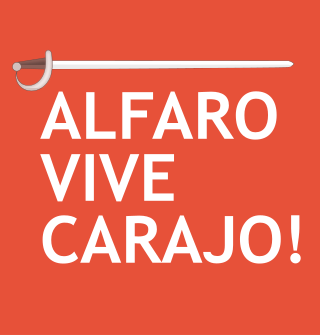
¡Alfaro Vive, Carajo! (AVC), another name for the Fuerzas Armadas Populares Eloy Alfaro, was a clandestine left-wing group in Ecuador, founded in 1982 and named after popular government leader and general Eloy Alfaro. The group was labeled as a terrorist organization by the Ecuadorian state during the period of the former president León Febres Cordero. It existed between 1983 and 1991, when it carried out various armed actions and criminal acts in Ecuador, with Colombian (M-19) and Nicaraguan influence. The group was initially formed sometime in the 1970s, but was not active militarily for the first few years of the 80's.
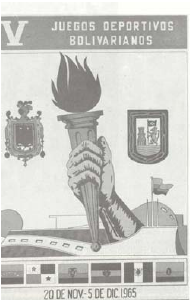
The V Bolivarian Games were a multi-sport event held between November 20 - December 5, 1965, in Quito and Guayaquil, Ecuador. The Games were organized by the Bolivarian Sports Organization (ODEBO).

Félix Sánchez Olympic Stadium is an open-air multi-purpose stadium in Santo Domingo, Dominican Republic. Opened in 1974 for the XII Central American & Caribbean Games and renovated 2003 Pan American Games is the largest stadium in the Dominican Republic used mostly for football and track and field and as a music venue. The stadium has a sporting events' capacity of 27,000 people, though it has seen crowds of 35,000. For concerts, its stated capacity is 50,000 people.
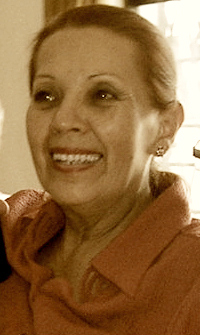
Violeta Luna is an Ecuadorian poet, essayist, professor and literary critic.
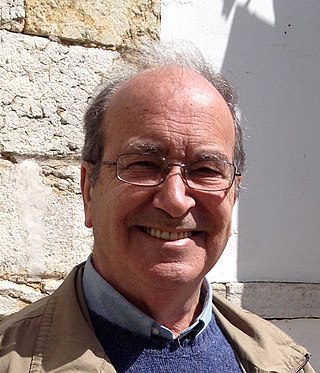
Juan Manuel Rodríguez López is a Spanish-born, naturalized Ecuadorian author and professor. He holds a licenciate/BA degree in philosophy and a doctorate in literature from Pontificia Universidad Católica del Ecuador (PUCE). He was a professor at Universidad Central del Ecuador and Universidad Católica, as well as a founding professor of Universidad San Francisco de Quito, where he was Dean of the College of Communication and Contemporary Arts.

Gamavisión is a state-owned Ecuadorian television network. The network was one of Televisa's partners in Ecuador until 2016. The network belongs to financial Group Isaías and is owned by Company Teledos SA Pacific TV.
Jaime Enrique Aymara Reinoso is an Ecuadorian singer and actor of tecnocumbia, tecnopaseíto bachata, national music, pasillo, pump Bolero, guayno jukebox pop music merengue, pop-flamenco, cumbia pop ballads, salsa, vallenato reggaeton and waltz. The lyrics of their songs are based on true stories of people in their country is known as "The idol of Ecuador" and "The idol of Quinceañeras", besides being much in demand in Latin concerts performed abroad as it is known for Ecuadorian emigrants.

Pablo Alfonso Espinosa de los Monteros Rueda is an Ecuadorian former news anchor. He was also vice-president of news of Ecuavisa in Quito. He holds the Guinness World Record for "Longest career as Television News broadcaster".

elDiario.es is an online newspaper based in Spain. Founded in 2012 and published only in Spanish, it has been available since 18 September 2012. eldiario.es is managed by Ignacio Escolar, a journalist who was the first editor of Público. eldiario.es includes amongst its staff the former journalists of Público upon cessation of its print edition. It is published by the company 'Diario de Prensa Digital S.L.' eldiario.es reported that in 2016, it had revenues of 3,680,172 euro and 3,184,280 in expenses, with a profit of 340,030 euro. eldiario.es published every three months a magazine monograph, called Cuadernos.

Isabel Noboa Pontón de Loor is an Ecuadorian businessperson, the founder and chief executive officer of the Nobis Consortium, one of the largest business groups in Ecuador. She is considered one of the most prominent women entrepreneurs in Latin America, and is known for philanthropic initiatives.
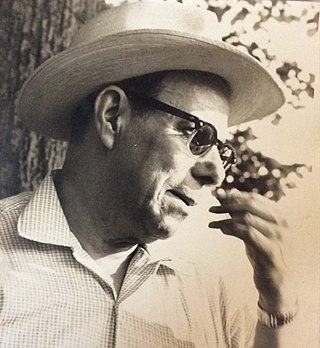
Oswaldo José de los Ángeles Castro Intriago was an Ecuadorian journalist, teacher, poet, statistician, translator/reviser, and novelist. He was instrumental in founding Chone's first newspaper, the cultural weekly El Iris; in organizing the first census of the city of Quito, Ecuador as president of its technical commission; and in promoting the United Nations' Food and Agriculture Organization as its liaison officer for Southern Latin America. While in retirement in Madrid, Spain, he published La Mula Ciega (1970), a loosely autobiographical novel about two teenagers coming of age in the early 1900s with Chone, Bahía de Caráquez, Quito, Guayaquil, and the Galápagos as backdrops.
Gilda Holst Molestina was an Ecuadorian writer and academic. Her narrative made use of humor and irony, in addition to the treatment of themes related to gender inequality.
La Travesia World Tour is the world tour by the Dominican superstar Juan Luis Guerra Tour promote his 10th studio album La Llave de Mi Corazón. It was his longest tour at the time and consisted in six legs, 54 shows and visited United States, Latin America, Europe and Asia, where his made his debut in Japan. Also, it was his biggest international tour in more than a decade, marking his first time in many years that he performed in countries such as Ecuador, Paraguay and Costa Rica since the Bachata Rosa World Tour (1991-92). The tour kick off on July 12, 2008, and ended on December 5, 2009, in Amsterdam, Netherlands.

Paola Vintimilla Moscoso is an Ecuadorian model who became a TV presenter and a member of Ecuador's National Assembly. She then returned to being a TV presenter working for the company whose live broadcast was taken over by an armed gang..

This article presents a timeline of the most relevant events in the history of LGBT people in Ecuador. The earliest manifestations of lesbian, gay, bisexual, and transgender (LGBT) people in Ecuador were in the pre-Columbian era, in cultures such as Valdivia, Tumaco-La Tolita, and Bahía, of which evidence has been found suggesting that homosexuality was common among its members. Documents by Hispanic chroniclers and historians—such as Pedro Cieza de León, Gonzalo Fernández de Oviedo y Valdés, and Garcilaso de la Vega—point to the Manteño-Huancavilca culture in particular as one in which homosexuality was openly practiced and accepted. However, with the Spanish conquest, a system of repression was established against anyone who practiced homosexuality in the territories that currently make up Ecuador.

María Auxiliadora Balladares Uquillas is an Ecuadorian writer and professor at Universidad San Francisco de Quito.
The Jorge Carrera Andrade Award is a literary award given by the Municipality of Quito, Ecuador to the best poetry book published during the year. It is awarded simultaneously with the Joaquín Gallegos Lara National Fiction Prize, on 1 December of each year. This happens in commemoration of the Day of Quito Interculturality, which takes place as part of the city's founding celebrations.













